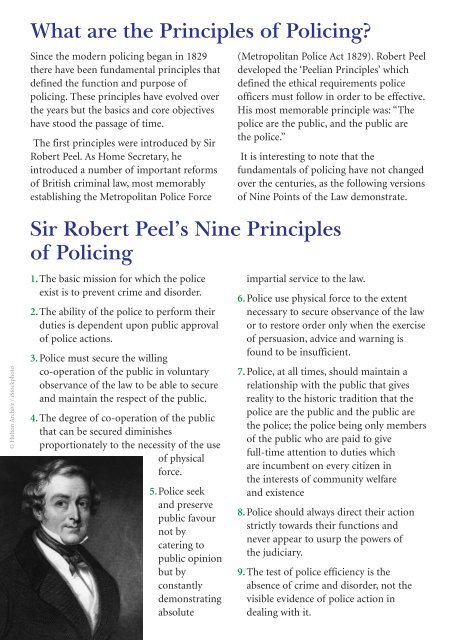Office of Constable pamphlet - Police Federation
Office of Constable pamphlet - Police Federation
Office of Constable pamphlet - Police Federation
Create successful ePaper yourself
Turn your PDF publications into a flip-book with our unique Google optimized e-Paper software.
What are the Principles <strong>of</strong> Policing?<br />
Since the modern policing began in 1829<br />
there have been fundamental principles that<br />
defined the function and purpose <strong>of</strong><br />
policing. These principles have evolved over<br />
the years but the basics and core objectives<br />
have stood the passage <strong>of</strong> time.<br />
The first principles were introduced by Sir<br />
Robert Peel. As Home Secretary, he<br />
introduced a number <strong>of</strong> important reforms<br />
<strong>of</strong> British criminal law, most memorably<br />
establishing the Metropolitan <strong>Police</strong> Force<br />
(Metropolitan <strong>Police</strong> Act 1829). Robert Peel<br />
developed the ‘Peelian Principles’ which<br />
defined the ethical requirements police<br />
<strong>of</strong>ficers must follow in order to be effective.<br />
His most memorable principle was: “The<br />
police are the public, and the public are<br />
the police.”<br />
It is interesting to note that the<br />
fundamentals <strong>of</strong> policing have not changed<br />
over the centuries, as the following versions<br />
<strong>of</strong> Nine Points <strong>of</strong> the Law demonstrate.<br />
© Hulton Archive / iStockphoto<br />
Sir Robert Peel’s Nine Principles<br />
<strong>of</strong> Policing<br />
1. The basic mission for which the police<br />
exist is to prevent crime and disorder.<br />
2. The ability <strong>of</strong> the police to perform their<br />
duties is dependent upon public approval<br />
<strong>of</strong> police actions.<br />
3. <strong>Police</strong> must secure the willing<br />
co-operation <strong>of</strong> the public in voluntary<br />
observance <strong>of</strong> the law to be able to secure<br />
and maintain the respect <strong>of</strong> the public.<br />
4. The degree <strong>of</strong> co-operation <strong>of</strong> the public<br />
that can be secured diminishes<br />
proportionately to the necessity <strong>of</strong> the use<br />
<strong>of</strong> physical<br />
force.<br />
5.<strong>Police</strong> seek<br />
and preserve<br />
public favour<br />
not by<br />
catering to<br />
public opinion<br />
but by<br />
constantly<br />
demonstrating<br />
absolute<br />
impartial service to the law.<br />
6. <strong>Police</strong> use physical force to the extent<br />
necessary to secure observance <strong>of</strong> the law<br />
or to restore order only when the exercise<br />
<strong>of</strong> persuasion, advice and warning is<br />
found to be insufficient.<br />
7. <strong>Police</strong>, at all times, should maintain a<br />
relationship with the public that gives<br />
reality to the historic tradition that the<br />
police are the public and the public are<br />
the police; the police being only members<br />
<strong>of</strong> the public who are paid to give<br />
full-time attention to duties which<br />
are incumbent on every citizen in<br />
the interests <strong>of</strong> community welfare<br />
and existence<br />
8. <strong>Police</strong> should always direct their action<br />
strictly towards their functions and<br />
never appear to usurp the powers <strong>of</strong><br />
the judiciary.<br />
9. The test <strong>of</strong> police efficiency is the<br />
absence <strong>of</strong> crime and disorder, not the<br />
visible evidence <strong>of</strong> police action in<br />
dealing with it.
















